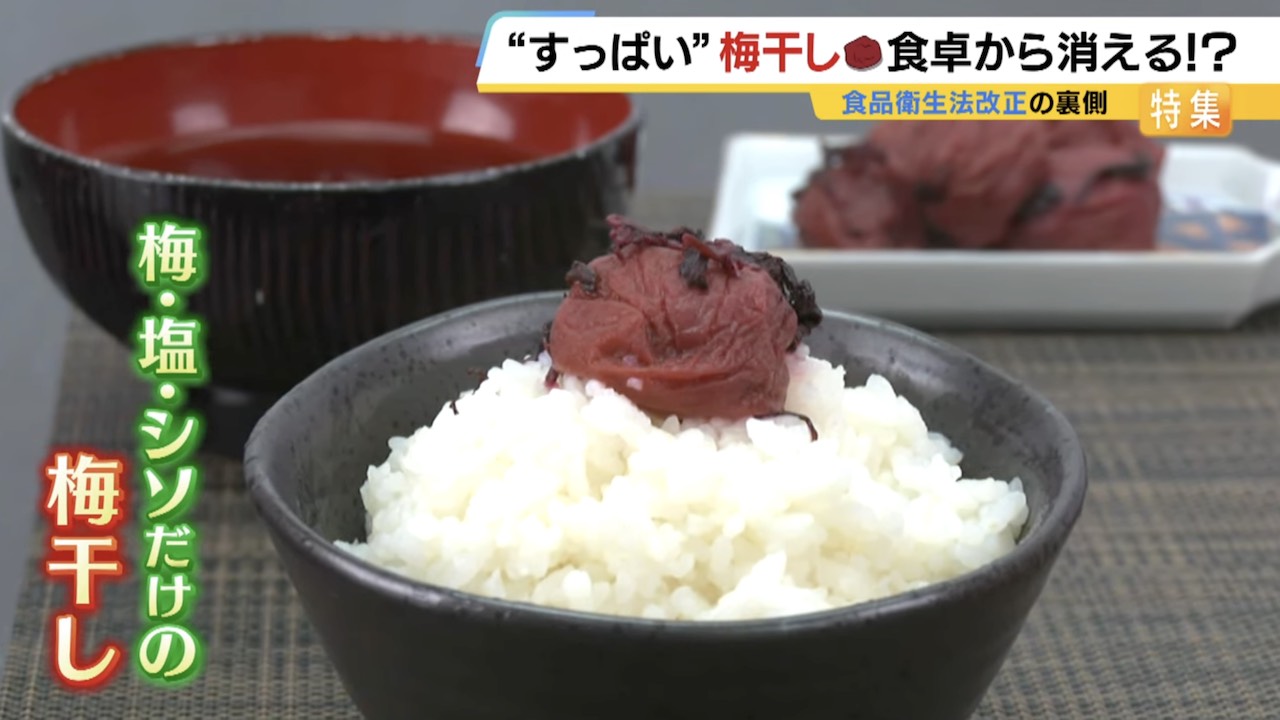Wakayama, Jun 12 (News On Japan) - The umeboshi industry is in crisis! The cause is the amendment of the Food Sanitation Law following the 2012 food poisoning incident. Facility renovations required by the law have led some farmers to cease umeboshi sales, citing unprofitability. In response, young people in Wakayama Prefecture have taken action.
The simple taste of umeboshi, made from ume and salt per traditional recipes handed down through generations, has long been loved in Japan. Wakayama, renowned for its ume production, attracts customers nationwide to its direct sales outlets, seeking these unique umeboshi.
A visitor at a local direct sales store said, ‘I love umeboshi. I can't do without them. This one is so sour!’
However, there is a looming crisis that could reduce the number of traditional umeboshi producers. The president of a direct sales store lamented, ‘Wakayama is known for umeboshi. If we can't handle umeboshi products, it will be tough for us.’
The 2012 food poisoning incident in Sapporo, Hokkaido, which resulted in eight deaths, was caused by lightly pickled Chinese cabbage. This incident led to the amendment of the Food Sanitation Law, changing the manufacturing and sale of pickles from a notification system to a permit system starting this June. Umeboshi are no exception.
Previously, five individual producers sold their homemade umeboshi at this direct sales store, but starting this month, only two remain. ‘Those who make umeboshi by hand are withdrawing. Although they follow proper procedures to prevent foreign matter contamination, the legal barriers seem too high,’ said a store representative.
We visited one of the producers, Izumi, a fourth-generation ume farmer. He takes pride in the health benefits of Wakayama's rich food culture, which he attributes to his good health. For over 20 years, Izumi has sold his homemade umeboshi at local direct sales outlets. However, the new law requires significant modifications to his facility, such as separate sinks for washing ume and other items, and installing lever-type faucets operable by elbows.
Izumi estimated that the required renovations would cost several million yen. ‘It's just not viable for me. I’m ready to give up. Even if I invest the money, I don't know what will happen.’
Izumi's decision to stop selling his umeboshi, despite having loyal customers who seek his products, is a tough one. In this crisis, the Ume Boys, young people active mainly in Minami-Town, Wakayama Prefecture, have stepped up. The leader, Masao Yamamoto, aims to rejuvenate the ume industry, gathering young people nationwide to manage orchards and produce umeboshi.
Born into a family of five generations of ume farmers, Yamamoto founded his company at the age of 25. He studied pharmacy at Hokkaido University Graduate School but left during his second year to pursue his passion for umeboshi. ‘I couldn't find the traditional sour umeboshi I grew up eating, so I decided to make them myself. Initially, it was just for fun, but I soon became passionate about umeboshi production and wanted to rejuvenate the aging industry with young energy.’
Yamamoto's factory underwent renovations to comply with the new law. He devised cost-effective solutions, such as using waterproof paint up to waist height and covering walls with plastic sheets instead of full waterproofing. Yamamoto shares his know-how freely and offers consultations to ume producers nationwide. His efforts have enabled some to meet the new requirements and continue their business.
A couple from Okayama visited Yamamoto's factory. They inherited an ume orchard three years ago and began making umeboshi. The recent law amendment made them rethink food safety and genuine taste. They appreciated Yamamoto’s cost-effective compliance ideas, which included using a double curtain instead of double doors to separate the workspace.
The Ume Boys receive consultations from across Japan, including remote support. By May, some producers had successfully renovated their facilities and obtained sales permits. The Ume Boys are committed to maintaining food safety while preserving the traditional sour taste of umeboshi. The harvest season is now in full swing.
Source: MBS
















